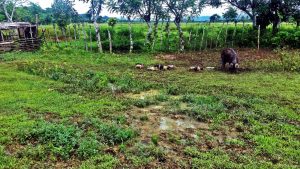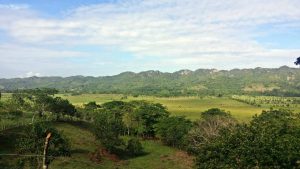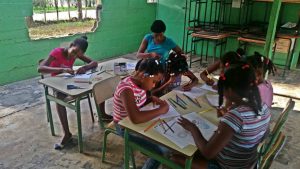This project is made possible through the partnership of WATER CHARITY and the NATIONAL PEACE CORPS ASSOCIATION. ![]()
Location
Rincon Claro, Sabana Grande de Boya, Monte Plata, Dominican Republic
Community Description
Rincon Claro is an isolated, rural community in northern Monte Plata and is 23 kilometers away from the closest hospital. Monte Plata is one of the 5 poorest provinces in the Dominican Republic, and the community is in one of the furthest, most hard to reach corners of the province.
The land is flat and has surrounding mountains. It rains often and makes access in and out of the community very complicated. The area is surrounded by former “bateyes,” which were communities where Haitians were brought to cut the surrounding sugar cane. The descendants of these sugar cane cutters still live in these rural, largely isolated communities.
The land is now used for agriculture and cattle raising and the people living in the communities tend to the land when it is available to them. The majority of local residents work on farms and sustain just enough income to take care of family expenses such as food, water, and travel to the farm fields where they work.
 The community has a small rural clinic and a very motivated doctor who lives in the community. There are also a few local health promoters, who are also community leaders. Finally, the community also has a school that goes up to eighth grade.
The community has a small rural clinic and a very motivated doctor who lives in the community. There are also a few local health promoters, who are also community leaders. Finally, the community also has a school that goes up to eighth grade.
Problem Addressed
In a community diagnostic done by the local clinic of all 400 homes of the area, 44 homes were identified as not having latrines. Reasons for living under these conditions include a lack of funds or assistance to build new latrines.
Project Description
This project is to build 16 ventilated pit latrines in the community.
Due to soft terrain, the latrines will be built on a base of cement block (2 lines of the block). The holes will be 3 meters deep and lined with rock to at least 1 meter, and the concrete plates will be made with a local mold. The latrine itself will be 1 square meter, and the walls will be made of zinc, with a wooden frame.
There will be some modifications to the construction of the individual latrines based on the terrain. Care will be taken to avoid contamination of the groundwater by ensuring that the pit is at least two meters above the water table.
The Health Committee has conducted several meetings regarding issues such as hygiene, sanitation, and sexual health. Recently, a Latrine Committee was created, consisting of the Volunteer and 4 active health promoters, and the local doctor.
 The Latrine Committee will survey all 44 families in need and will make a list that selects and prioritizes the 16 who would benefit most from the assistance. The committee will use an assessment survey (created by the Volunteer and edited by the committee) to conduct home visits. Homes without latrines and mothers with children under the age of 5 (13%) will be given priority.
The Latrine Committee will survey all 44 families in need and will make a list that selects and prioritizes the 16 who would benefit most from the assistance. The committee will use an assessment survey (created by the Volunteer and edited by the committee) to conduct home visits. Homes without latrines and mothers with children under the age of 5 (13%) will be given priority.
Before starting the project, the 16 beneficiary families will participate in and graduate from both a health training and latrine maintenance course, taught by the health promoters of the latrine committee.
The families will be responsible for paying the mason directly for his labor and providing someone in the family to assist the mason in construction. This laborer will learn the skills required to construct and maintain a latrine. In conjunction with the latrine committee, the families will be responsible for preparing and storing certain materials for construction and providing food and water for all laborers.
Project Impact
80 people will benefit from the project.
Peace Corps Volunteer Directing Project
Hope Tambala
Sustainability, Monitoring, and Maintenance
This community-driven project has a strong sustainable foundation. Since the families must provide their own labor and obtain a mason for the entire project, the physical work involved with the project stays in-house and the community laborers involved learn latrine construction skills that will benefit them in future projects.
Since the local clinic staff is involved, this project will have institutional support along the way and will be able to function once the Volunteer leaves.
All of the Rincon Claro will be involved and demonstrate their accountability and desire to complete the project due to a desire to do another project of this magnitude in the future. This project could be the first of many community-driven initiatives, and the skills and knowledge acquired through this process (budgeting of grant funds, physical labor during the construction, and organization of materials) will help the community in potential future projects.
The community will take pride over the project and the local clinic will be active in its sustainability. Additionally, the appropriate use and maintenance of the latrines by the recipients will be monitored continuously every 3 months by the local health promoters, local doctor, and the volunteer.
The participation by Water Charity in this project has been fully funded through the generosity of the Paul Bechtner Foundation.